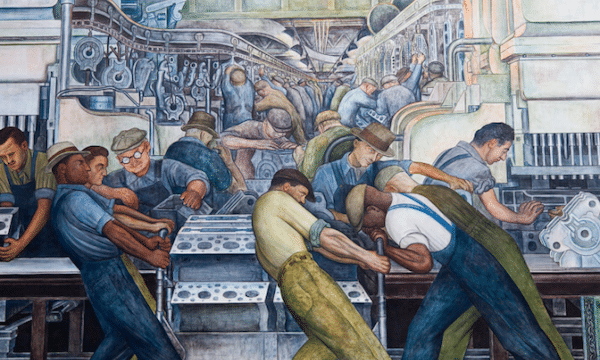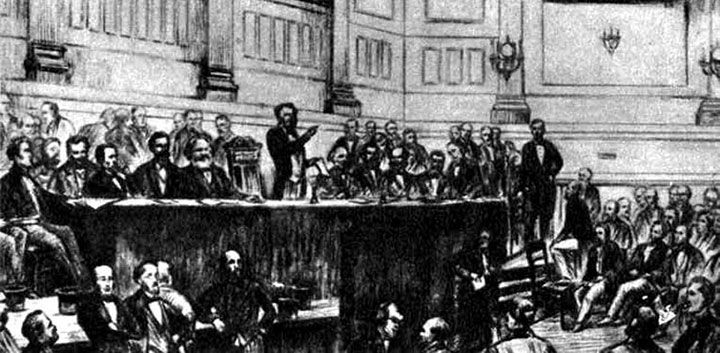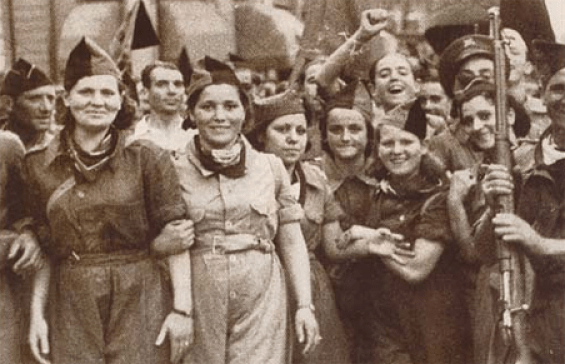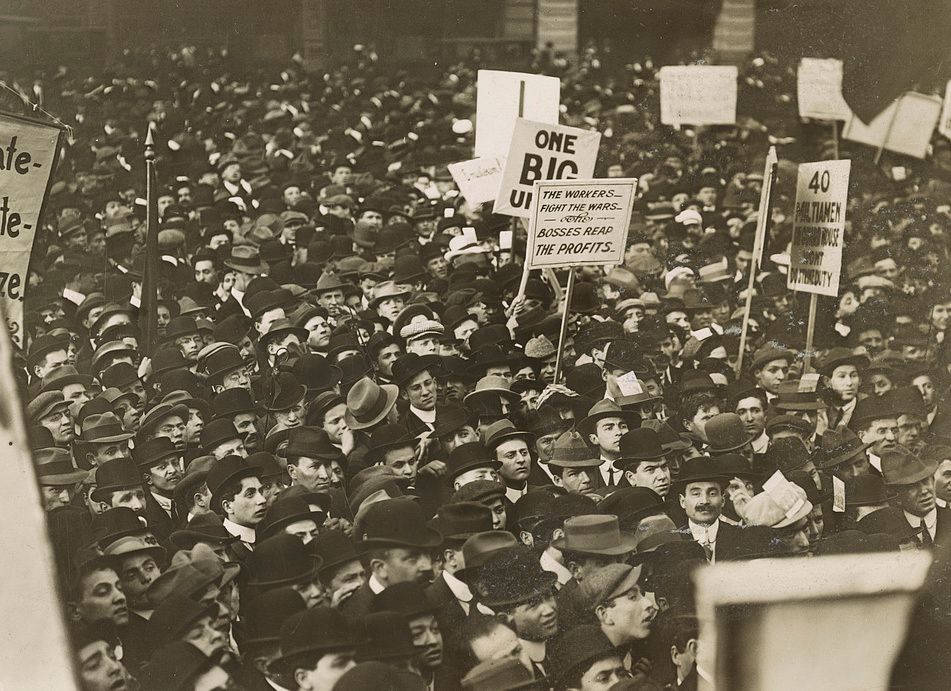
I shall be
Unity and Struggle, Friends and Foes: The United Front
Text/Fries Fries
Correction: Eisenstein
Foreword: The Method of Struggle
Earlier I wrote an article on the united front issue in which I called for a coalition of democratic socialists and anarchists. However, at that time, I obviously knew neither "democracy" nor "socialism", much less "anarchism" and "revolution", and I even explained the main difference between democratic socialism and anarchism as "right Revolution and reform”, the criticism of anarchism took the angle of “argumentation of the necessity of bureaucratic government”. For the specific criticism of this article, you can read "Discussion and Criticism of the "Relationship between Democratic Socialism and Anarchism" written by Eisenstein of the same company for details. Of course, perceiving the absurdity in one's past writings is precisely good news, which means that my mind has always progressed rather than stagnated.
I tweeted this two months ago:
"I don't think debating and tagging on Twitter is an effective struggle situation. Although I am not qualified to say that, I hope that everyone who sees this article can think about this issue. Sometimes I feel that the principle is We've talked enough about the low-level things, it's time to think about how to do it."
I'm not against further discussion and research on theory, the main reason for my opinion is that the phenomenon I see is not "further discussion and research on theory", but more like labeling myself and others, People with different "positions" fight each other "camp wars", just like children pretending to be family wine. If it is said that the line of parliamentary struggle " is only by means of an unexpectedly rapid increase in the number of votes, which are periodically marked, and likewise strengthens both the confidence of the workers in victory and the fear of the enemy " (Engels, "Class Struggle in France - Introduction"), then in What are the benefits to the working class of "matching the line" online? When people are still roaming freely on major online platforms and other people "seeking fun" and "leaving leftist memberships", workers have been subjected to extremely cruel and inhuman exploitation and oppression.

"What did the leaders do during this period? What did they decide? What did they do to ensure the victory of the revolution in an emergency, in a situation that would at least determine the fate of the next stage of the revolution? We Nothing seen, nothing heard! Probably working-class trustees are discussing thoroughly and deeply. But what is needed now is action." - Rosa Luxemburg, What are the leaders doing? 》
"The experience of the last three days is a loud call to the leadership of the working class: No talk! No endless discussion! Action!" - Rosa Luxemburg, Negligence
However, in the face of the above arguments, some people will respond to the "revolutionary difficulty theory", arguing that China's authoritarian rule at this time makes any public propaganda and struggle impossible, so one should only hope for the regime's self-collapse.
Lenin responded as follows:
"On the contrary, it is entirely possible, and historically much more likely, that autocracy will collapse under the pressure of some spontaneous outburst or unforeseen political conflict that may occur on all sides at any time. However, any A political party will never base its activities on the hope of such outbreaks and conflicts, unless it falls into adventurism. We should go our own way and persevere in our own systematic work. The more we do not point to By chance, we are less likely to be overwhelmed by any "historical turn". " - Lenin, "Where To Begin? 》
In order to form a systematic and disciplined struggle, we must have an organization and a program, as well as the broad masses of socialists and proletarians who are willing to join the organization and maintain the program. Only here can we get rid of the passive state and take the initiative in the situation. . In order to form such an organization and establish such an alliance, we must be clear about the necessity of a "united front" and its specific implementation methods.

Association and Criticism
Some of today's new leftists, or simply called "leftists", are different from the general definition of "leftists". They are not only keen to think about drastic changes in economic and political systems, but also are keen to destroy existing societies. institutional action. In today's Internet as the best channel for dissemination of information, the left in the youth is usually referred to as the "net left", which usually includes anarchists, Marxist-Leninists, Trotskyists, social democrats Socialists and democratic socialists, as well as other young groups of left-wing revolutionary ideologies, and sometimes even establishment “socialists” who are sympathetic to the current Chinese regime. Some people's criticism of "Internet Leftists" often focuses on the phenomenon of "expulsion from the left" (now the term expulsion from the left has been divorced from its own meaning). "Internet Leftists" of different positions attack each other and completely deny each other's ideas They regard the other side as the "enemy," and sometimes it shows that attacking dissidents is better than the goal of radical reform of the existing social system. On the subject of divisions, the Spanish Civil War is often cited as a lesson in the struggle with the left, and the anti-fascist alliance continued to disintegrate in the division between anarchists and communists, which eventually led to the tragic victory of fascism ending.

However, criticism as an important tool for ideological progress cannot be given up. Marx's critique of feudal and utopian socialism is of great value, as is the revolutionist's critique of reformism. At the same time, Marxists' criticism of existing Marxist theories is also valuable. The so-called scientific method is to continuously conduct experiments after making assumptions and finally form a theory. The theory does not mean the final form of knowledge. Any Theory should first be "quenched in the fire of practice", as Lukács Georg wrote in History and Class Consciousness:
"So, orthodox Marxism does not mean uncritical acceptance of the results of Marx's research. It is not a 'belief' in this or that thesis, nor is it a commentary on some 'holy' book. Quite the contrary, in the question of Marxism The orthodox method of the word refers only to method. It is the scientific belief that dialectical Marxism is the correct method of research that can only develop, expand and deepen in the direction laid down by its founders."
Since endless "attacking each other" and division is not feasible, but criticism is also a weapon that cannot be given up, how to balance these two seemingly conflicting actions?
The Communist Manifesto written by Marx and Engels pointed out:
Communists fight for the immediate aims and interests of the working class, but they also represent the future of the movement in the current movement. In France, the Communists united with the Socialist Democratic Party against the conservative and radical bourgeoisie, but did not thereby give up their right to be critical of the rhetoric and fantasies inherited from the revolutionary tradition. In Switzerland, the communists supported the radicals, but did not ignore that the party was made up of contradictory elements, part French-style democratic socialists, part radical bourgeois. Among the Poles, the Communists supported the party that made the agrarian revolution a condition of national liberation, the party that launched the Krakow uprising of 1846. In Germany, as long as the bourgeoisie takes revolutionary action, the Communist Party joins it in opposing the autocratic monarchy, the feudal land ownership and the reactionary nature of the petty bourgeoisie. But the Communist Party did not neglect for a moment to educate the workers as clearly as possible about the hostile antagonism of the bourgeoisie and the proletariat, so that the German workers could immediately use the social and political conditions that the rule of the bourgeoisie necessarily entails as an anti-bourgeois weapons in order to start the struggle against the bourgeoisie itself immediately after the overthrow of the reactionary classes in Germany.
In short, the Communists everywhere support all revolutionary movements against the existing social and political system. In all of these movements, they place particular emphasis on the question of ownership as the fundamental issue of the movement, no matter how well it develops. Finally, Communists everywhere strive for unity and coordination among democratic parties around the world .
To oppose meaningless splits and at the same time support all movements that are beneficial to the socialist revolution, this is the current position that all socialist parties, organizations, clubs and individuals should hold. The purpose of the debate should be distinguished from the dogmatic struggle between orthodox and heretical status in medieval religion, as in today's Christian teaching, whether or not Mary is the mediator between man and God, as long as you recognize and trust Christ in ten Die on the rack for the world, and you can get redemption. Institutions do not arise from the strong will and radical means of man, but from historical conditions, and no one in the bourgeois revolution will call himself a "Rousseauist", "Montesquieuian", "Kantian" "Republicans" or "Jeffersonians," and at best call themselves radical republicans or constitutional monarchs, but such divisions will not prevent the advent of new capitalist modes of production. When the old mode of production becomes a shackle, the new mode of production will replace the old mode of production, and the new mode of production will become a shackle again and will be replaced by another new mode of production.
"Old forms of communication that have become fetters are replaced by new forms of communication adapted to the more developed productive forces, and therefore to the progressive mode of individual self-activity; the new forms of communication will become fetters and then be replaced by other forms of communication. Since these conditions at each stage of historical development correspond to the development of the productive forces in the same period, their histories are at the same time the history of the developing productive forces inherited by each new generation, and thus are also The history of the development of the power of the individual himself.—Marx, Engels, "The German Ideology""
The social forms of each period and place are not created arbitrarily, but are created by the people under various historical conditions. We cannot revise the history that has happened, but the history that has happened can prompt us to sum up the experience of our predecessors and move forward.
"Men make their own histories, but not at will, not under conditions of their own choosing, but under conditions directly encountered, given, inherited from the past." Karl Marx, "The Eighteenth Brumaire of Louis Bonaparte"

Friends and Foes Today
Friends are different from exploited, it means characters who know each other and can help each other. The way to distinguish friends from enemies depends on whether they are "beneficial to the socialist revolution," a requirement that contains three elements, "socialism," "revolution," and "beneficial." Although there is still a bit of feudal corpse stench in the air today, but today is different from the past, and the different camps that exist today are not exactly the same as when Marx wrote The Communist Manifesto, so it needs to be done again. Analysis, especially the analysis of all current camps in China.
"Secondly, it is clear that the critique of socialist literature does not appear to be complete today, since this critique covers only up to 1847; it is equally clear that the treatment of the Communists' attitude towards various opposition parties is (Chapter 4) Although correct in principle today, it is outdated today as far as its practical application is concerned, because the political situation has completely changed, and most of the parties listed at that time have been completely swept away by the development of history. "—Engels, "The Communist Manifesto: Preface to the English Edition of 1888"
Socialism means public ownership of the means of production, and what is beneficial to socialism or supporting socialism means supporting public ownership of the means of production. Even if there is disagreement on the method of implementing public ownership, the most basic is to carry out the “public ownership” of the past state capitalism. Reflection is necessary, as I put it in The Socialist Revolution of the Twentieth Century:
"The new socialist revolution must be built on the corpse of the old socialist revolution, and we must find what happened in the old socialist revolution, find the cause of its death, and find a new line. If not, then We will only become corpses like it. Although there are still various differences between people from different positions on the current situation of the struggle for the future socialist revolution and the post-revolutionary system, I think we must face up to the past. The failure of the revolution, who single-mindedly calls for revolution but still thinks that we can follow the same revolutionary form exactly as past history, will not only be completely imitating its form, but also its results.”
Regarding solidarity, I explained in the beginning with the help of quotations that solidarity must be based on the complete agreement of general principles and selected means. If our solidarity is merely rhetorical without making any practical commitment, then we cannot be "friends", and such solidarity cannot be a real and effective solidarity. The coalition of the left needs to reach various cooperation agreements and confirm the specific form of cooperation.
Who are friends? In general, all kinds of libertarian leftists who oppose private ownership (such as social anarchists and libertarian Marxists) can be friends, while less authoritarian ones who do not insist on solipsism and are willing to accept the free movement of other left wing factions The left wing of anti-private ownership can also cooperate in the case of cooperation agreements and cooperation methods.
In general, what can be "friends" needs to support public ownership of the means of production, while reflecting on the failures of past policies, support the revolution and the establishment of the dictatorship of the proletariat, respect the economic and political equal rights of the proletariat, and realize that unity is a necessary prerequisite for success . Ideological differences are not the only factor to be considered in factional unity, it also includes cooperation and collaboration between groups, trust and tolerance.
Who is the enemy? According to the above criteria, then there are probably some factions that we want to oppose to know one or two. Proponents of private ownership, dictators who attempt to use revolutionary regimes to establish autocratic rule, and various types of people who have compromised the rights of some proletarians because of their sociocultural identities.
While it is said that proponents of private ownership are the enemy, and social democrats fit this definition, the question of whether to join forces with reformist social democrats has been the subject of more radical discussions among some Chinese revolutionary socialists, This is especially true for socialists who want to adopt a moderate revolution, but given that this article focuses on the problems of the Chinese revolution, the real conditions in China must be taken into account.

If in the West, social democrats can win a certain degree of policy in the parliament that is beneficial to the people at the bottom, how can a similar form of parliamentary struggle be adopted in China? To this question, some of the social democrats who were not determined to answer me said that it can only be "realized in a dream", while others chose to join forces with the radical liberals. They recognized revolution, but only the revolution that established bourgeois democracy; they recognized equality, but only "equality" under bourgeois rule. And trying to do this is like "using a bookmark and then folding the corner of the book" as superfluous. It can be seen from this that the society envisaged by the Chinese social democrats is purely utopian, and what they support is neither socialism nor revolution, and therefore is even less likely to be beneficial to the socialist revolution.
Social democrats (welfare capitalists) are far from revolutionary socialists in their general principles and methods because they do not themselves pursue the abolition of private ownership of the means of production and revolution. It is no longer a group included in our solidarity, however, this does not mean that the social democrats have become our permanent enemies, to whom a neutral attitude is usually chosen, provided that they do not actively collude with the bourgeois government , will support them against the main threat as other larger threats emerge.
The enemy the revolution will face is not a lamb to be slaughtered. On the contrary, in order to maintain the dictatorship of the bourgeoisie, the enemy has established a pervasive law enforcement system and armed troops. Now these have become difficulties that revolutionaries must deal with.
In recent years, many left-wing associations have emerged in some high schools or universities in China. However, under the high-pressure control of the government, most associations can only hold activities in the form of reading clubs, and some "early birds" who try to take further action , some of them were recruited, and some of the organizers were arrested. But this does not mean failure, encountering resistance is a normal thing, but for us who have victory as our goal, we need to learn from these cases. There is no connection between different societies, and their activities are organized by their own members. When the forces cannot be concentrated, they are broken down one by one. Regarding how to unify and gather all forces, this is a detailed question. Since I don’t know much about the methods of organizing everything in the past, this part just wants to call on today’s leftists to put the united front on the agenda and deal with it as soon as possible. this problem.
An open letter to current and future members of the Society
When we established or joined an organization, we all recognized the necessity of revolution. The comrades among us were all staunch revolutionary socialists. We firmly believed that the subversion of capitalism could only be achieved by subverting the regime of the dictatorship of the bourgeoisie. form to achieve. Since we affirm the importance of the revolution, we need to pay attention to the function of the organization. The individual struggle of socialists who are scattered, scattered, undisciplined and commanded cannot achieve revolution. Revolution can only be achieved through collective unity. Action is realized.
Disagreements and conflicts are inevitable. Zhang San and Li Si are neighbors, and there is a conflict between them, but one thing is very important - the conflict between them is not a class conflict. The expansion of the revolutionary ranks means adding all kinds of people, but we can neither require each of them to be a Marxist philosopher, nor can we require each of them to be rational and have lofty moral qualities. To say that there is such a demand is nothing but pure petty-bourgeois wishful thinking. In order to expand the revolutionary ranks, the first quality is not the theoretical basis nor the moral quality, but - tolerance.
Having different political views in different things is just the embodiment of healthy politics, so I have nothing against anyone with different political views than me. Since "ists" with different lines can unite the front, then almost the same line Members of the Landwig Society should stick to this principle even more. Even though debates are usually sharp, as exemplified by the mutual criticism of Luxemburg and Lenin, they were ruthless in pointing out each other's problems, but we must remember that they were not stingy in their criticism of each other. of appreciation.
Comrades - like-minded revolutionaries with the same aspirations, it is our common aspiration to build a country of true freedom. We should realize that the opponent in the debate among "comrades" is not the enemy, and the purpose of the debate is not to win the debate, but to "debate the truth". All our activities should revolve around this goal, and therefore we must overcome the fragmentation caused by differences. Through mutual tolerance, mutual understanding, mutual trust, and unity towards one goal, victory will be ours.
"May people everywhere have courage and hope, for the Cross is sinking, midnight is passing, and joy is coming with the dawn." - Eugene Victor Debs, "Before Hearing the Judgment" 's speech

references:
International Working Men’s Association (First International), The Problem of Solidarity among Socialists Worldwide, https://www.marxists.org/chinese/first-international/marxist.org-chinese-Iinternational-1877b.htm
Rosa Luxemburg, What are the leaders doing? , https://www.marxists.org/chinese/rosa-luxemburg/marxist.org-chinese-rosa-19190107.htm
Rosa Luxemburg, Negligence, https://www.marxists.org/chinese/rosa-luxemburg/marxist.org-chinese-rosa-19190108.htm
Vladimir Lenin, "Where to start? " https://www.marxists.org/chinese/lenin-cworks/05/001.htm
Lukacs Georg, History and Class Consciousness, https://www.marxists.org/chinese/georg-lukacs/1922/03.htm
Friedrich Engels, Introduction to Karl Marx "The Class Struggles in France 1848-1850", https://www.marxists.org/chinese/engels/marxist.org-chinese-engels-1895 -3-6.htm
Karl Marx, Friedrich Engels, The German Ideology, https://www.marxists.org/chinese/marx/marxist.org-chinese-marx-1846.htm
Karl Marx, The Eighteenth Brumaire of Louis Bonaparte, https://www.marxists.org/chinese/marx/1851-1852/01.htm
Eugene Victor Debs, Speech Before Hearing the Judgment https://www.marxists.org/chinese/reference-books/mia-chinese-eugene-debs-19180914.htm
Like my work?
Don't forget to support or like, so I know you are with me..
Comment…